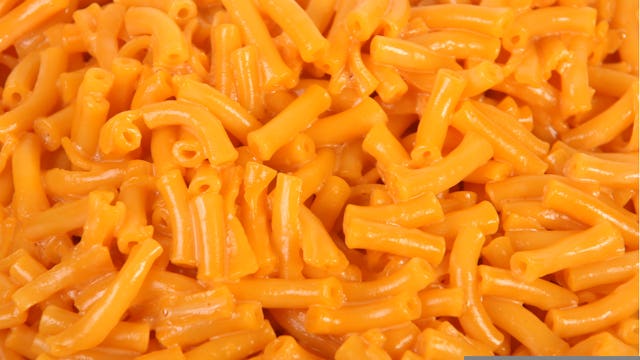You Can't Escape Dangerous Chemicals In Most Boxed Mac & Cheese

Boxed mac and cheese may come with an unwanted side of phthalates
Mac and cheese isn’t just a childhood staple, it’s an entire food group. Parents of picky eaters know the panic of reaching into the pantry and realizing you’re out of the good stuff. We feed it to our kids knowing they’ll eat it and tell ourselves that the “cheese” part provides them with protein and calcium. But what if they’re getting a dose of chemicals too?
A new study reported by the New York Times says boxed macaroni and cheese contains high level of chemical phthalates. That sound you just heard was a million parents saying, “Fuck” simultaneously.
If the word ‘phthalates’ sounds scary, that’s because it is. They can disrupt male hormones like testosterone. Dr. Sheela Sathyanarayana, associate professor of pediatrics at the University of Washington in Seattle, who studies phthalates, says there’s a link between exposure to phthalates early in life (think prime mac and cheese consumption years) and neurodevelopmental and behavior problems in young children, such as aggression, hyperactivity and possible cognitive delays.
And if you’re a pregnant mom who’s got a craving for comfort food, you’re screwed too. Doctors say there’s a strong evidence that phthalates block the production of the hormone testosterone in utero too. “That means there is less testosterone available to the developing male fetus, and since testosterone is absolutely vital to build his reproductive organs, the worry is that you will get malformations and other kinds of problems that translate to health effects later,” said Dr. Heather B. Patisaul professor of biological sciences at the Center for Human Health and the Environment at North Carolina State University in Raleigh.
In case you’re suddenly feeling smug because you spring for the pricey, organic boxed mac and cheese, not so fast. “Our belief is that it’s in every mac ‘n’ cheese product — you can’t shop your way out of the problem,” said Mike Belliveau, executive director of the Environmental Health Strategy Center, who funded the study in part.
That’s because phthalates aren’t an ingredient. They’re chemicals found on food processing equipment like plastic tubes, gaskets, conveyor belts and packaging. And they particularly love to bind to fatty foods, like powdered cheese.
“The phthalate concentrations in powder from mac and cheese mixes were more than four times higher than in block cheese and other natural cheeses like shredded cheese, string cheese and cottage cheese,” said Belliveau.
Well, crap.
The FDA is aware of phthalates in our food and considers them to be “indirect food additives.” That’s not exactly reassuring. A FDA spokesperson told The Times, “The F.D.A. continues to monitor literature and research on these compounds as it becomes available.” Europe has already gotten rid of many phthalates in food production, so there’s hope that maybe with enough recognition of the issue the U.S. could follow suit.
In the meantime we can try making mac and cheese from scratch, but any mom who’s attempted it knows that kids will turn their nose up the fresh stuff, no matter how gooey and delicious it is.
Crackers and applesauce for dinner it is.
This article was originally published on